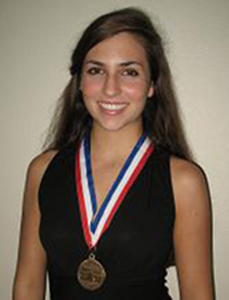Webpage last updated: August 16, 2024

In May 2011, home school student Madison Chapman attended her fourth National History Day competition in College Park, Maryland. Because of her dedicated participation in the Florida History Fair since sixth grade and the excellent caliber of her many entries, Madison received Florida's senior-division Outstanding State Award at the national contest. Her 2011 historical paper was titled "Property or Person: The Debate and Diplomacy of the Three-fifths Compromise." Home school students are welcome to participate in National History Day. Here are Madison's thoughts about her experience:
As any homeschooler knows, being educated outside the walls of a public or private school can sometimes mean different experiences with competitive programs like sports, science fair, or mathletes. However, when it comes to history fair, it's easy to get involved in this versatile and incredibly rewarding competition.
I have been fortunate enough to attend the Florida History Fair (FHF) state contest for the past six years. And in grades 6, 9, 10, and 11, I qualified for Nationals and participated in the excitement of National History Day in Washington, D.C. Florida History Fair has taught me invaluable lessons and helped me hone my skills in researching, interviewing, and writing. And above all, I have delved into the most intriguing topics and learned about some truly fascinating people and eras in history. History Fair is both educational and genuinely fun for all students who participate.
Like any middle or high school student, homeschoolers have the opportunity to choose from exhibit, documentary, web site, performance, and historical paper as their means of telling a story from history. This provides you with a chance to best use your skills, such as art, technology, or writing, and apply them to a project. Homeschoolers should check with their county's historical commission or school district if they are interested in competing at the local level. When moving on to the state competition, county coordinators are always enthusiastic about assisting all students, including homeschoolers. For those who qualify for the national contest, the FHD state coordinator provides a wealth of information and a wonderful dose of optimism to help you prepare for this highest level of the competition. I have enjoyed every minute of my history fair experience, and I urge all students to get involved. While becoming an expert on your topic and learning research skills, you also will be preparing yourself for real college work. The judging process, which is much like defending a dissertation, teaches you about poise and public speaking. And the entire project will help you develop your creativity, presentation, writing, or technology skills. Overall, the Florida History Fair experience is definitely an impressive addition to any college application.
Best of luck to prospective competitors and, to get you started, here are my top five suggestions for succeeding in your history fair projects.